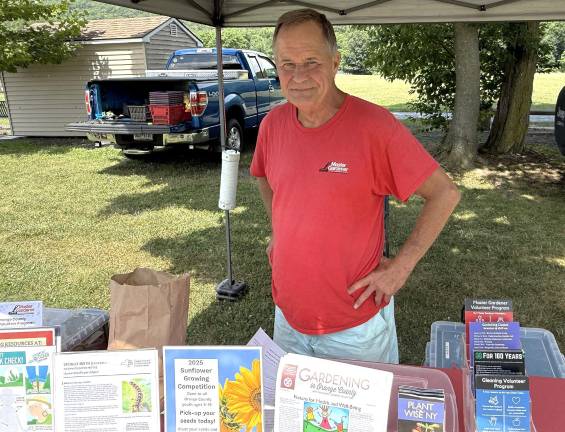Popcorn on the cob makes debut
Greenwood Lake. The freshly harvested treat made its first appearance at the Lakeside Farmers Market.

Late last year Jeff Bialis of J&A Farm in Goshen had just harvested a crop of “popcorn ears” that he had planned to introduce at the Lakeside Farmers Market during this season, but it required time to dry out and prepare itself for its debut on July 12, 2025.
“Since this is now ready to be popped, it took about three to six months until the moisture content was low enough,” Bialis said. “So after you remove the kernels from the cob you just treat it like regular popcorn. If, for example, you want to do it in an air popper, put half a cup in a paper bag and pop it like microwave popcorn and in about 2 1/2 minutes it fills the bag. A half cup gets you a lot of popcorn. And it tastes like the best popcorn you ever had!”
Popcorn on the cob comes from a specific variety of maize known as zea mays everta, which is the only type of corn that pops when heated. Unlike sweet corn or field corn, it is distinguished by its very hard outer shell, dense, starchy interior, and a low moisture content for popping after it is dried.
After being planted in the spring, it is usually harvested when it’s fully matured in the fall. But, instead of removing the kernels from the cob, J&A Farms leaves them on as a specialty item. The cobs are dried naturally, often for several weeks, to reduce the moisture content to just the right level so the kernels will pop properly.
Also on display were Baby bok choi, a powerhouse of essential vitamins and minerals like A, C, and K, as well as manganese and iron. It’s also low in calories and high in fiber, making it a great addition to a healthy diet. Serve them sautéed with olive oil and fresh garlic for an easy supplement to any dish.
Meanwhile, Master Gardener Jim Hall was on duty to describe how to guard against being bitten by ticks and how to protect certain flowering and vegetable plants from attacks by invasive insects. The Spotted Lanternfly, an invasive insect from Asia, primarily feeds on the invasive Tree-of-Heaven, but it often devours grapes, hops, apples, blueberries, stone fruits, maples, black walnut, birch, and willow trees. It’s best to kill them on site as recommended by both the states of New York and New Jersey.
The Lakeside Farmers Market - open each Saturday from 9 a.m. to 1 p.m. through the end of October at Winstanley Park on Windermere Avenue in Greenwood Lake - continues to be a source valuable community information and serves as an opportunity to personally meet with local growers and producers of prepared foods and artisan crafts. It is also a collection point for food scraps and accepts both SNAP and Market Bucks.
To learn more, log onto GWLNY.org.